#alexander pope
Explore tagged Tumblr posts
Text
I was looking at poetry that Jane Austen might have read and I came across Lady Mary Wortley Montagu. She sounds like an amazing woman. She thought her governess was dumb, so she hid in the family library and, "She taught herself Latin, a language usually reserved for men at the time. She secretly got a hold of a "Latin dictionary and grammar" and by the age of thirteen, her handling with the language was on par to most men. Furthermore, she was also a voracious reader."
She married an ambassador to the Ottoman empire and brought smallpox inoculation back to England. She was also a poet and important writer. In addition, she laughed at poet Alexander Pope (he is quoted in Austen's works) when he declared his love for her. (pictured below). (https://en.wikipedia.org/wiki/Lady_Mary_Wortley_Montagu)
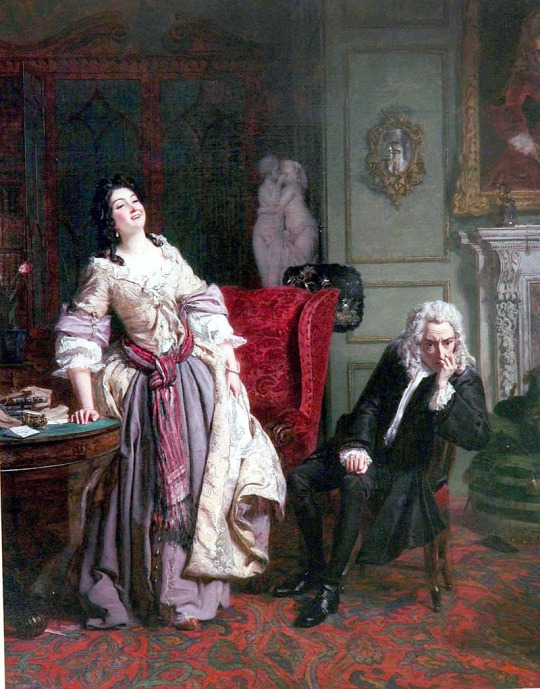
The fact that someone heard about this proposal and then painted it is *chef's kiss*
(Edit) Here is the poem I used in a story:
A Hymn to the Moon
Written in July, in an arbour Thou silver deity of secret night, Direct my footsteps through the woodland shade; Thou conscious witness of unknown delight, The Lover's guardian, and the Muse's aid! By thy pale beams I solitary rove, To thee my tender grief confide; Serenely sweet you gild the silent grove, My friend, my goddess, and my guide. E'en thee, fair queen, from thy amazing height, The charms of young Endymion drew; Veil'd with the mantle of concealing night; With all thy greatness and thy coldness too.
760 notes
·
View notes
Text
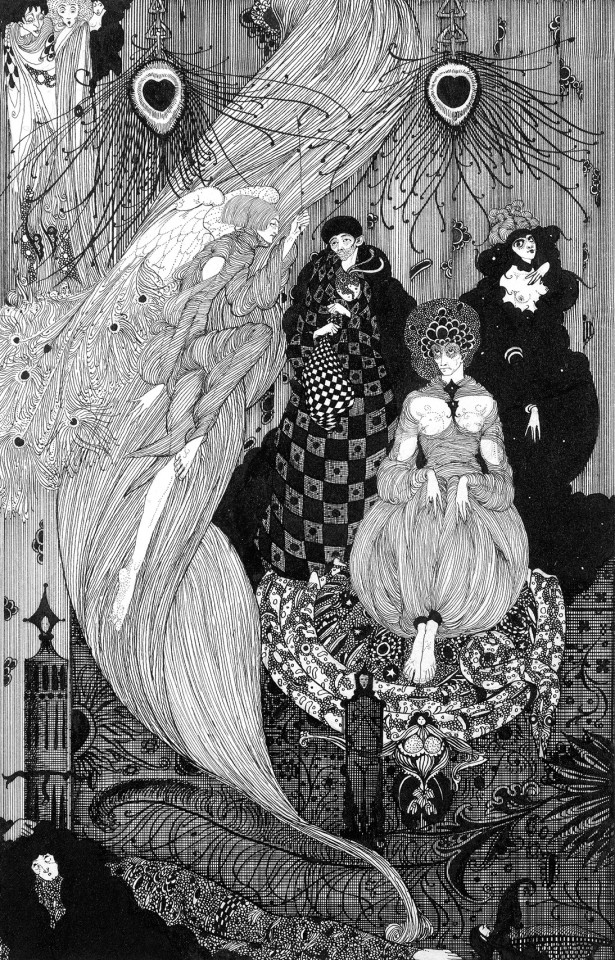
Down to the Central Earth, his Proper Scene, from Alexander Pope's The Rape of Lock by Harry Clarke (1913)
#harry clarke#art#illustration#art nouveau#1910s#1910s art#vintage art#vintage illustration#vintage#irish art#irish artist#books#book illustration#alexander pope#poetry#poetry art#golden age of illustration#classic art
454 notes
·
View notes
Text
In case you're wondering like I was: the reason why a lot of the 18th-century philosophers can't seem to stop making Cato the Younger references (Voltaire talks about Cato at least 6 or 7 times in Letters on England which is a lot because it's by no means a long text. Mandeville too of course — hi bestie!)
is because there was a play in the early 1700s about Cato (Addison's Cato, a Tragedy to be precise) which seemed to have had the cultural impact of early seasons of Game of Thrones

Catoo! this actor is from an 1800s production but still. Look at that facial expression. The sad wet cat energy. The pain in his eyes. It's all there!
Oh, and by 'cultural impact of Game of Thrones' I don't mean an increase in theatre subscriptions or of Cato action figures sales (though that would have been awesome!)
I mean it had a pretty significant influence on many of the American Revolutionaries (and French too most likely, since, cultural osmosis and all that). A lot of these nerds sure loved to quote it!
#also maybe this is super common knowledge and I just stumbled upon it now. many such cases.#in that case just sit back and enjoy Cato's sad wet cat eyes#cato the younger#roman republic#history#history memes#age of enlightenment#voltaire#mandeville#tagamemnon#1700s#18th century#philosophy#american revolution#amrev#french revolution#frev#theatre#alexander pope#literature#classics memes#classics
162 notes
·
View notes
Text
Lord Byron writing about book-burning, queer representation, and the value of poetry . . . in 1821:
“Let us hear no more of this trash about ‘licentiousness.’ Is not ‘Anacreon’ taught in our schools? translated, praised, and edited? Are not his Odes the amatory praises of a boy? Is not Sappho's Ode on a girl? Is not this sublime and (according to Longinus) fierce love for one of her own sex? And is not Phillips's translation of it in the mouths of all your women? And are the English schools or the English women the more corrupt for all this? When you have thrown the ancients into the fire it will be time to denounce the moderns. ‘Licentiousness!’ — there is more real mischief and sapping licentiousness in a single French prose novel, in a Moravian hymn, or a German comedy, than in all the actual poetry that ever was penned, or poured forth, since the rhapsodies of Orpheus. The sentimental anatomy of Rousseau and Madame de Staël are far more formidable than any quantity of verse. They are so, because they sap the principles, by reasoning upon the passions; whereas poetry is in itself passion, and does not systematise. It assails, but does not argue; it may be wrong, but it does not assume pretensions to Optimism.”
Context: this letter was written during the Bowles-Pope Controversy, a seven-year long public debate in the English literary scene primarily between the priest, poet, and critic William Lisle Bowles and the poet, peer, and politician Lord Byron. The debate began in 1807 when Bowles published an edition of the famous writer Alexander Pope’s work which included an essay he wrote criticizing the writer’s character, morals, and how he should be remembered. Today, we would say that Bowles tried to “cancel” Alexander Pope, who had affairs without marrying, and whose works had sexual themes. Lord Byron defended Pope, who was one of his all-time favorite writers. Pope had been dead since 1744, so he was not personally involved. This debate shows that while moral standards have changed throughout the centuries, the ways people have debated about morality have remained similar.
Source of the excerpt: — Moore’s Life of Byron in one volume, 1873, p. 708 - https://books.google.com/books?id=Q3zPkPC8ECEC&pg=PA708&lpg=PA708&dq=%22Are+not+his+Odes+the+amatory+praises
Sources on the Bowles-Pope Controversy: — Chandler, James. “The Pope Controversy: Romantic Poetics and the English Canon.” Critical Inquiry, vol. 10, no. 3, 1984, pp. 481–509. JSTOR, http://www.jstor.org/stable/1343304. — https://www.britannica.com/topic/Pope-Bowles-controversy — Bowles, Byron and the Pope-controversy by Jacob Johan van Rennes, Ardent Media, 1927.
#literature#english literature#romanticism#poetry#lord byron#aesthetic#dark academia#history#writing#alexander pope#literary#lit#english#reading#lgbt#sappho#book burning#book banning#libraries
503 notes
·
View notes
Text

#Here’s Something You Probably Didn’t Know About Alexander Pope#Alexander Pope#poetry#poety#poems#literature#race car#racecars#race-car driving#racecar driving#facts#trivia
93 notes
·
View notes
Text

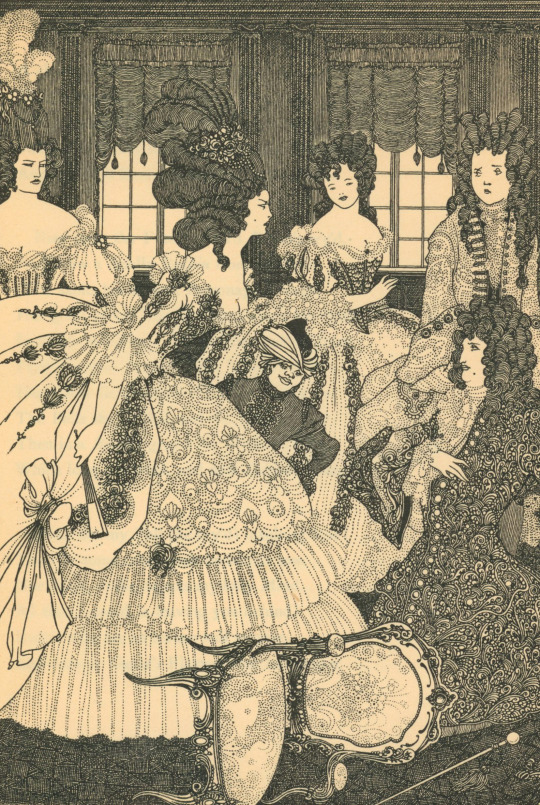
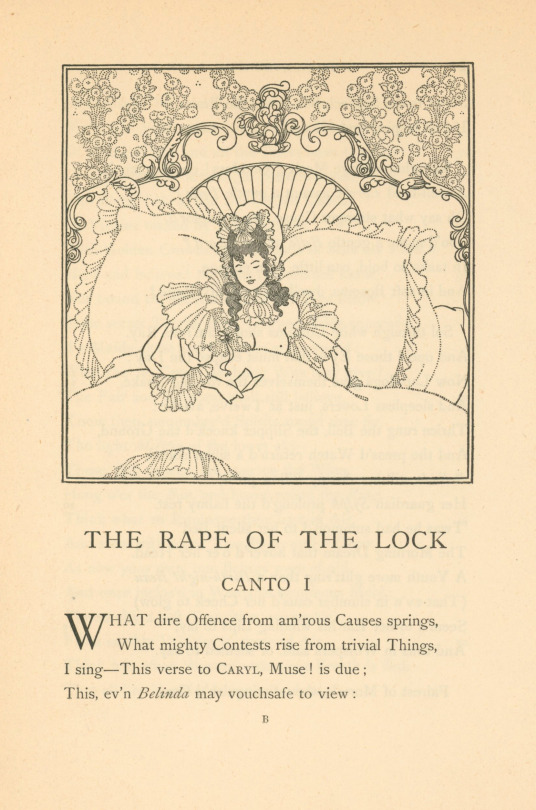
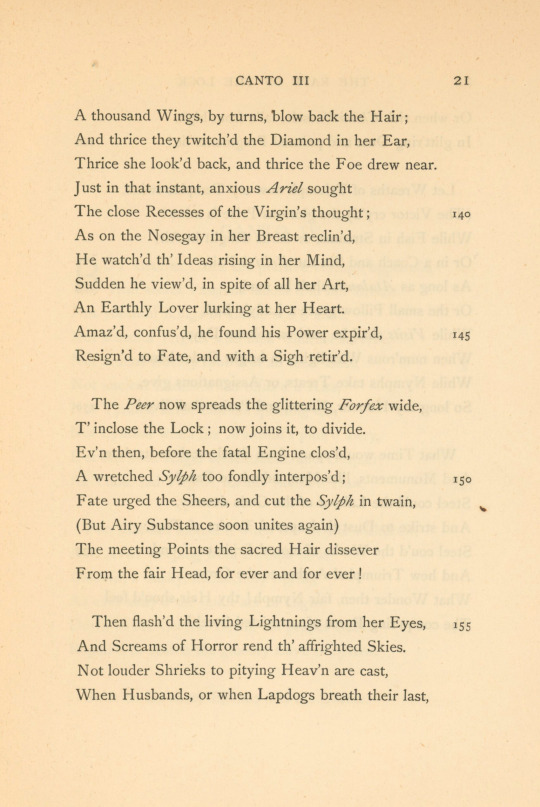
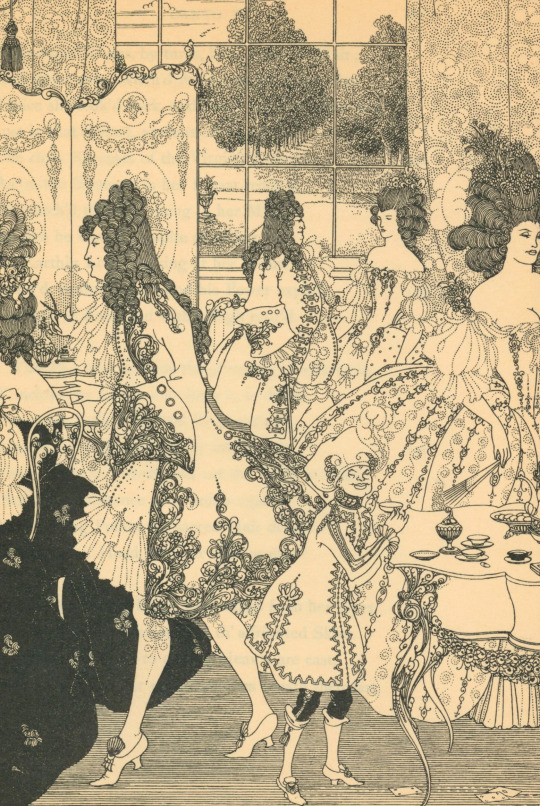
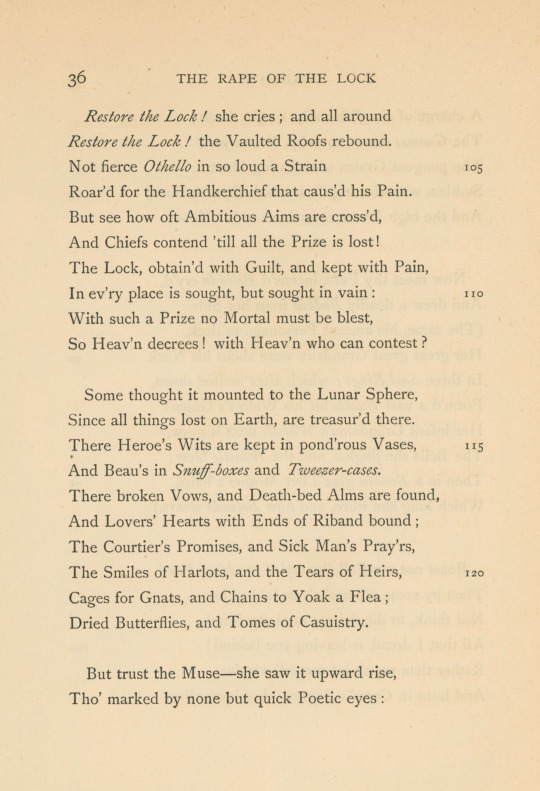
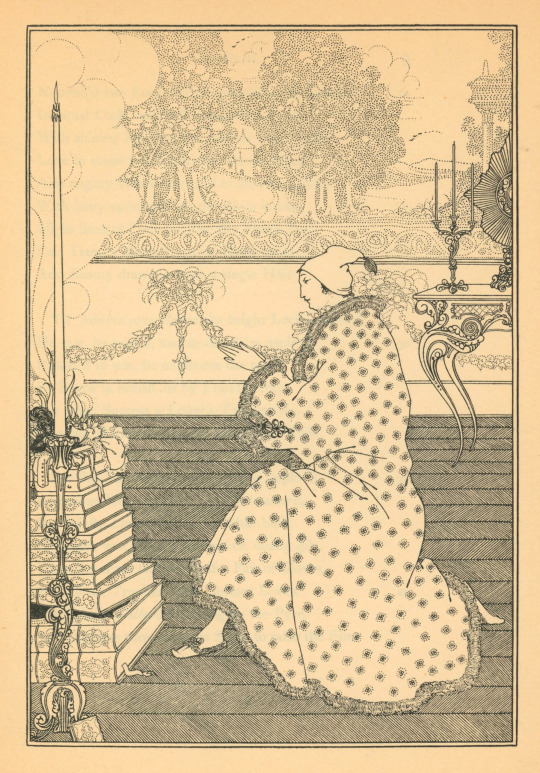

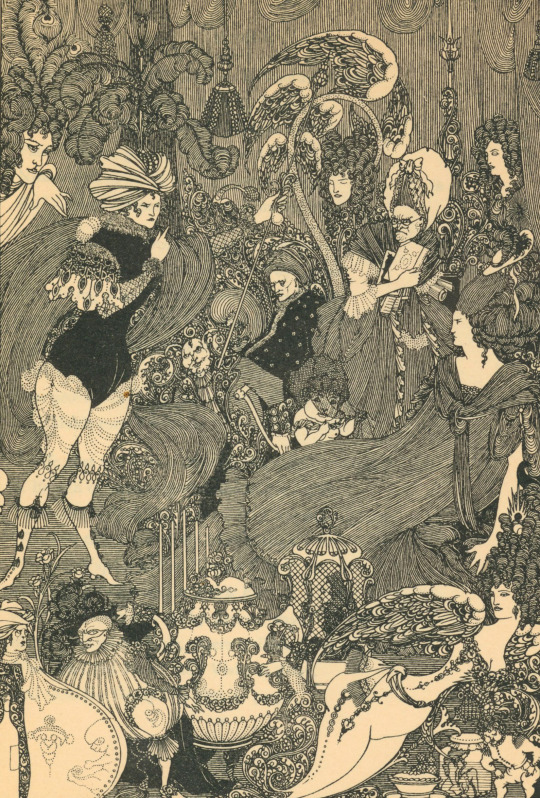
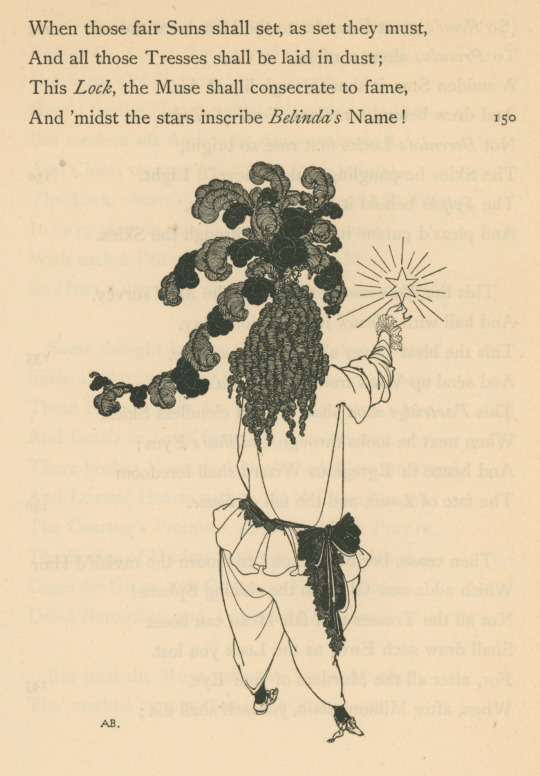
It’s Fine Press Friyay!
This week we’re digging into our 1896 copy of Alexander Pope’s (1688-1744) The Rape of the Lock: an heroi-comical poem in five cantos, which features decadent illustrations by Aubrey Beardsley (1872–1898). This crown quarto edition of 500 was issued in London by Leonard Smithers (1861-1907). It was printed on deckle edge paper at the Chiswick Press.
This publication is an excellent example of high burlesque, a style of satire in which “a literary, elevated manner was applied to a commonplace or comically inappropriate subject matter.” Pope’s epic treatment of a minor event of social trespass- the theft of a lock of Arabella Fermor’s (1696-1737) hair by Lord Petre (1689-1713), her suitor at the time of the incident and soon-to-be ex-fiancée, mocked the excessive role of social mores and morality in European culture of the era through exaggerated imitation.
Leonard Smithers was a London bookseller and publisher associated with the Decadent Movement, a 19th century Western European artistic and literary movement that prized aesthetic excess, artificiality, and hedonism. In addition to his support for Beardsley’s work, he also promoted the work of a number of controversial figure or the time including, amongst others, Max Beerbohm, Aleister Crowley, and Oscar Wilde.
The Chiswick Press was founded in 1811 by Charles Whittingham (1767–1840), who found success in producing accessibly priced editions of classics. His nephew Charles Whittingham II (1795–1876), who took over in 1840, was known for printing William Morris’s (1834-1896) early work, and would establish the press as part of the Private Press Movement in England, which started in reaction to the mechanization of book production. Contributors to the Private Press Movement championed the material qualities of their publications, lending heightened consideration to aesthetic choices and reviving traditional techniques of typography, binding, paper making, and printing.
--Ana, Special Collections Graduate Intern
View more Chiswick Press posts
View more Alexander Pope posts
View more Aubrey Beardsley posts
view more Fine Press Friday posts.
#Fine Press Friday#Fine Press Fridays#Chiswick Press#Aubrey Beardsley#Alexander Pope#crown quarto#The Rape of the Lock#high burlesque#satire#Decadent Movement#Leonard Smithers#Private Press Movement#Arabella Fermor#Lord Petre#Ana
104 notes
·
View notes
Text

Peter Forster (1934-2021), ''The Rape of the Lock'', 1989 Source
57 notes
·
View notes
Text
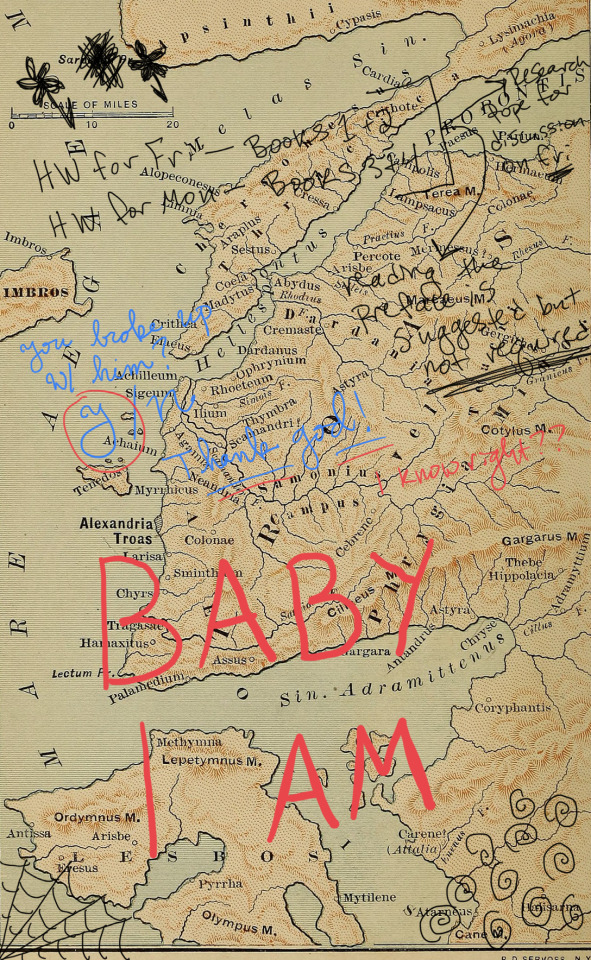
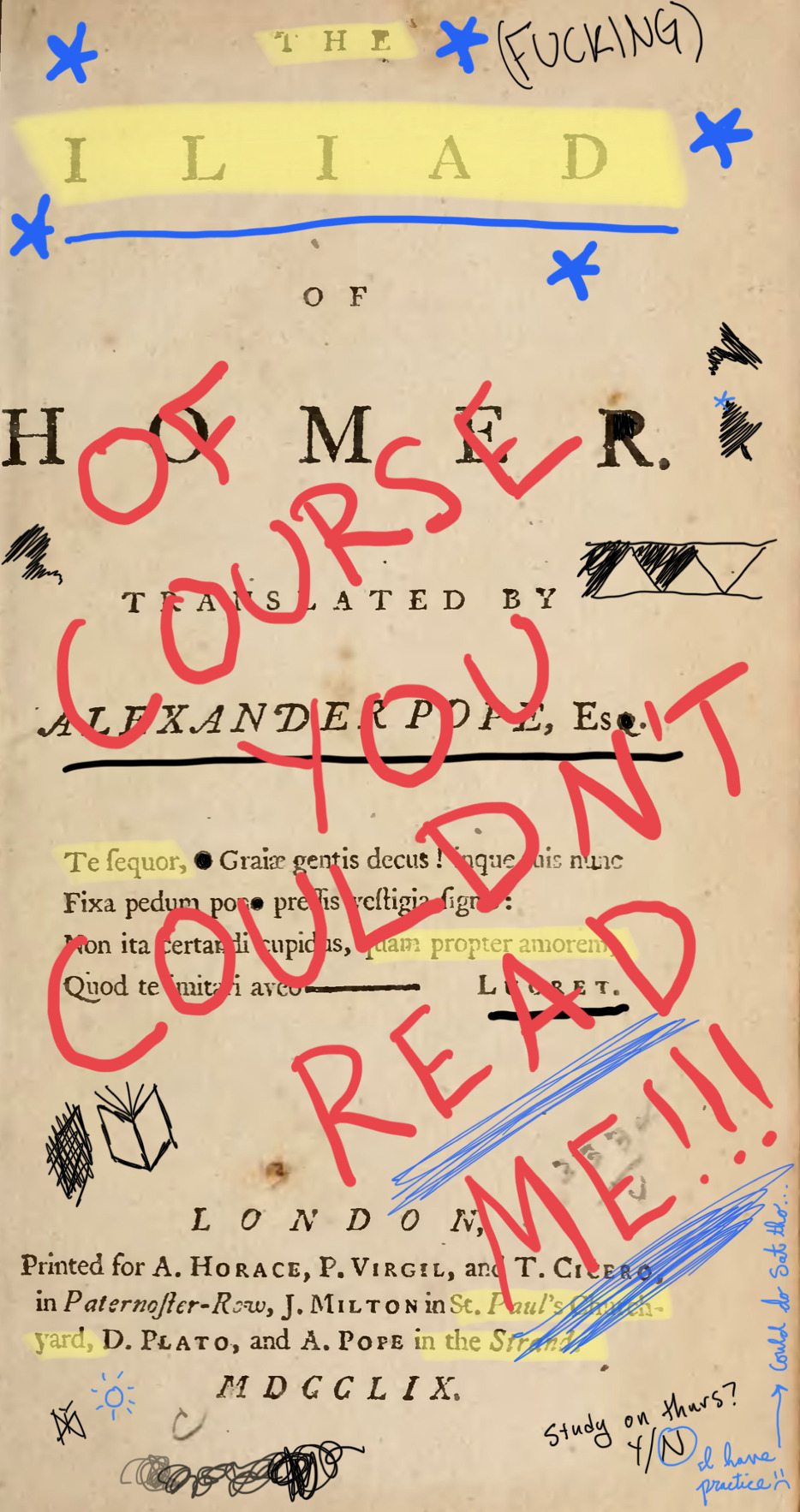
Pages from The Iliad, translated by Alexander Pope // Coming of Age - Maisie Peters
#a bit different from my usual stuff but i hope y'all like it anyway!#i'm starting a new job today so i didn't have a ton of time to edit something - sorry!#the iliad#homer's iliad#alexander pope#coming of age#coming of age maisie peters#good witch#the good witch#the good witch maisie peters#tgw#maisie peters the good witch#maisie peters tgw#tgw maisie peters#maisie peters#art#art history#lyrics#lyric art
197 notes
·
View notes
Text

THE POETICAL WORKS OF ALEXANDER POPE (London: Routledge, 1885) Illustrated with b/w plates by Sir John Gilbert
#beautiful books#book blog#books books books#book cover#books#vintage books#illustrated book#book design#victorian era#alexander pope#english poetry
24 notes
·
View notes
Text

Ode on Solitude
Happy the man, whose wish and care A few paternal acres bound, Content to breathe his native air, In his own ground.
Whose heards with milk, whose fields with bread, Whose flocks supply him with attire, Whose trees in summer yield him shade, In winter fire.
Blest! who can unconcern'dly find Hours, days, and years slide soft away, In health of body, peace of mind, Quiet by day,
Sound sleep by night; study and ease Together mix'd; sweet recreation, And innocence, which most does please, With meditation.
Thus let me live, unseen, unknown; Thus unlamented let me die; Steal from the world, and not a stone Tell where I lye. By Alexander Pope
56 notes
·
View notes
Text

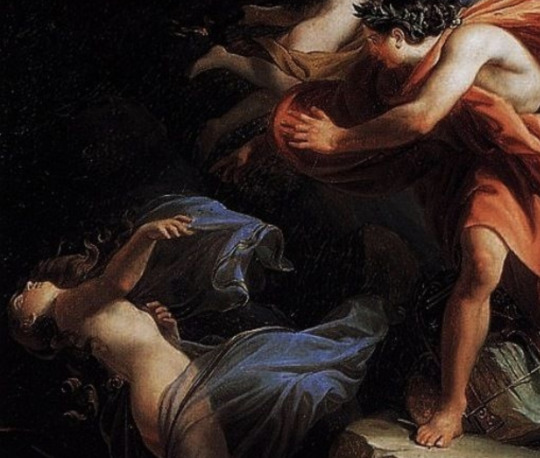


I shall only tell you that till you bade us Adieu, I hardly knew the value you had taught my heart to set upon you
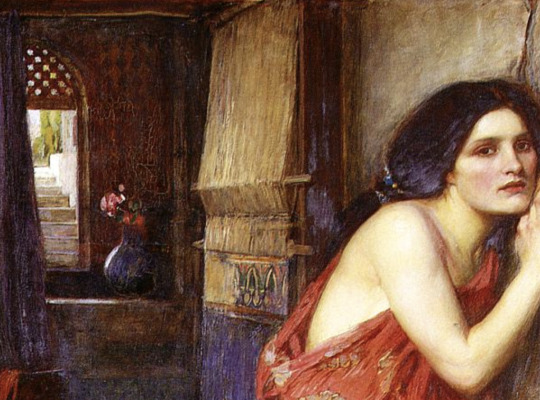
Line after line my gushing eyes o'erflow, Led through a sad variety of woe: Now warm in love, now with'ring in thy bloom, Lost in a convent's solitary gloom! There stern religion quench'd th' unwilling flame, There died the best of passions, love and fame.

Light Years by The National // Euridice recedes into the Underworld (detail) by Enrico Scuri // The Lord of the Rings by JRR Tolkien // Alexander Hamilton to John Laurens, April 1779 // Thisbe (detail) by John William Waterhouse // Eloisa to Abelard by Alexander Pope // Welly Boots by The Amazing Devil
---
Love and distance
#all my favourite things are about love and loss#the national#orpheus and eurydice#lotr#lams#pyramus and thisbe#alexander pope#the amazing devil#moodboard#aesthetic#dark academia
116 notes
·
View notes
Text


“…Fix’d is the term to all the race of earth;
And such the hard condition of our birth:
No force can then resist, no flight can save,
All sink alike, the fearful and the brave…” (Hector’s speech; Pope; ‘Iliad’ 6.)





#the iliad#homers iliad#Hector#prince hector#hector of troy#Troy#troy 2004#eric bana#greek heroes#ancient greek#homeric epics#alexander pope#Eric Banatic
121 notes
·
View notes
Text

The table yesterday. :: [Rebecca Solnit]
* * * *
How happy is the blameless vestal's lot! / The world forgetting, by the world forgot. / Eternal sunshine of the spotless mind! / Each pray'r accepted, and each wish resign'd 'Eloisa to Abelard', Alexander Pope
[alive on all channels]
#photography#Rebecca Solnit#Eloisa to Abelard#Alexander Pope#alive on all channels#eternal sunshine of the spotless mind#prayer#poetry#my favorites#daily life#every day#words and writing#reading and writing
25 notes
·
View notes
Text
I am with Them

#fifty days at Iliam#cy twombly#Philadelphia museum of art#Achilles#Patroclus#hector#shades of Achilles Patroclus and hector#Homer#pope#ilium#Iliad#the fire that consumes all before it#Alexander pope
14 notes
·
View notes
Text
reading about edmund curll, an important figure in erotic literature, and didn't know i was about to stumble across the most chaotic wikipedia page ever... i love historical literary drama

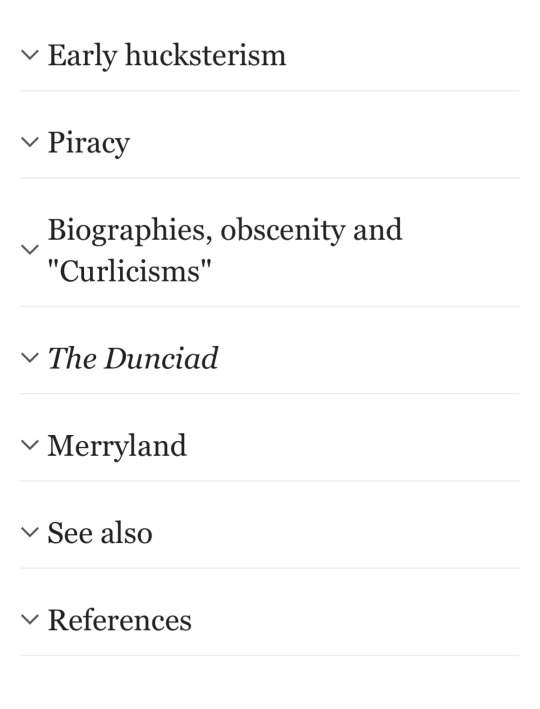
critics have always been the same
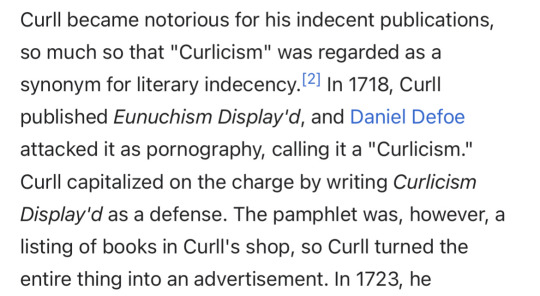
and of course where there is 1700s literary drama, alexander pope is always involved. no wonder byron idolized him and was involved in a seven-year long public debate concerning him... honoring him the way he'd like to be remembered (see: the pope-bowles controversy). don juan rly was a tribute to him. we need a series about the restoration era (behn/wilmot/dryden/etc) & of course the young romantics (byron/shelleys/keats/etc) and now we also need the augustan era (pope/montagu/now curll, etc.). someone please pplease please let me do an anthology series (in the vein of ahs or black mirror) about literary communities throughout history already!
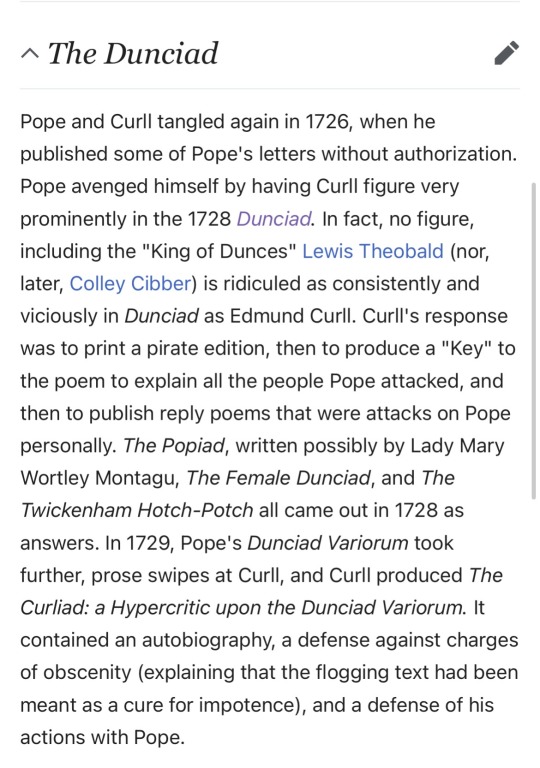


cartoonish levels of opportunistic behavior. manipulating every situation to work in his favor like a sitcom character...

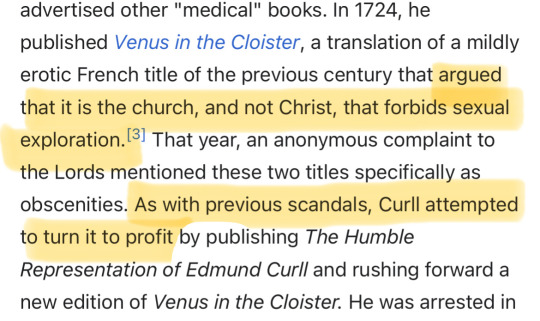

the most informative thing i've learned from edmund curll's wiki page is that in the 1700s, the name of the U.S. state "maryland" inspired a whole genre of erotica novels based on puns of the idea of a "[woman's name]-land," as evidenced by "bettyland." staples of the genre included colonization as a metaphor for patriarchal sexual conquest, & erotic descriptions of the female body which borrow from descriptions of natural landscape. much to think about re: postcolonial feminism - this quite literally proves the idea that colonization is inherently patriarchal
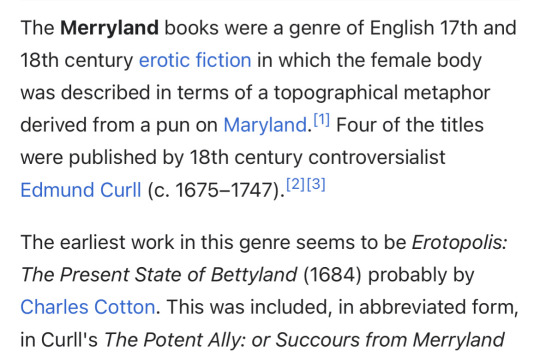
#EARLY HUCKSTERISM#alexander pope#the dunciad#wikipedia rabbit hole#wikipedia#edmund curll#literature#english literature#lit#books#feuds#literary feuds#history#funny#hilarious#memes#roast#slander#lord byron#literary history#english history#publication#publishing#long#my writing#publishers#pamphlet wars
71 notes
·
View notes
Text

Aubrey Beardsley (British, 1872-1898) • The Peacock Skirt, from The Rape of the Lock by Alexander Pope • 1896
#illustration#art#illustrator#artwork#aubrey beardsley#british artist#alexander pope#pen and black ink#drawing#ink drawing#british aestheticism#art nouveau#sassafras and moonshine blog#19th century british illustration#book illustration
53 notes
·
View notes